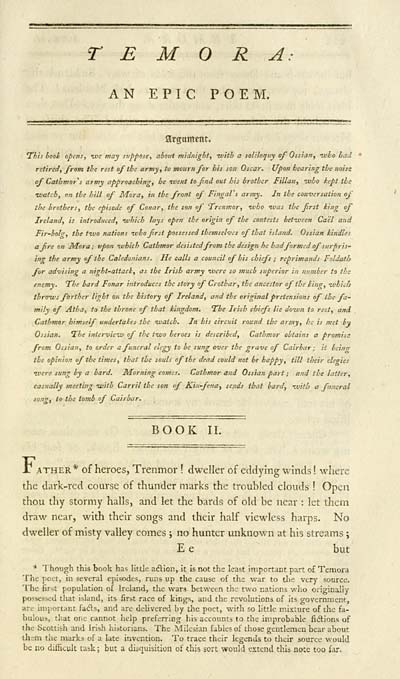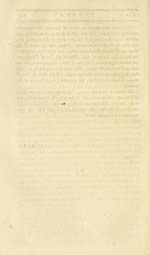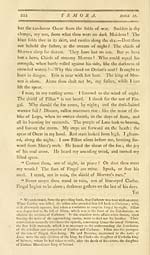Download files
Complete book:
Individual page:
Thumbnail gallery: Grid view | List view

T E M O R A
AN EPIC POEM.
argument.
This book opens, ive may suppose, about midnight, tvitb a scliloqiiy of Ossian, -who had
retired, from the rest of the army, to mourn for bis son Oscar. Upon bearing the noise
of Catbmors army approaching, be ivent to find out bis brother Fillan, who kept the
tvatcb, on the hill of Mora, in the front of Fingal's army. In the conversation of
the brothers, the episode of Conar, the son of Trenmor, -who tvas the first ting of
Ireland, is introduced, ivhicb lays open the origin of the contests bet-ween Ca'e'l and
Fir-io/cr, the tivo nations ivhofrst possessed themselves of that island. Ossian Undies
a fire on Mora; upon ivbich Catbmor desisted from the design hs bad formed of surpris-
ing the army of the Caledonians. He calls a council of his chiefs ; reprimands Foldatb
for advising a night-attack, as the Irish army ivcre so much superior in number to the
enemy. The bard Fonar introduces the story of dothar, the ancestor of the king, ivhicli
thro-ws fhrther light on the history of Ireland, and the original pretensions of the fa-
mily of Atha, to the throne of that kingdom. The Irish chiefs lie doivn to rest, and
Cathmor himself undertakes the -watch. In bis circuit round the army, he is met by
Ossian. The interviezv of the tzvo heroes is described, Cathmor obtains a promise
from Ossian, to order a funeral elegy to be sung over the grave of Cairbar ; it being
the opinion of the times, that the souls of the dead could not be happy, till their elegies
•were sung by a bard. Morning comes. Catbmor and Ossian part ; and the latter,
casually meeting -with Carril the son of Kin-fenoy sends that bard, ivitb a funeral
song, to the tomb of Cairbar.
BOOK II.
r ATHER* of heroes, Trenmor ! dweller of eddying winds ! where
the dark-red course of thunder marks the troubled clouds ! Open
thou thy stormy halls, and let the bards of old be near : let them
draw near, with their songs and their half viewless harps. No
dweller of misty valley comes j no hunter unknown at his streams ;
E e but
'* Though this book has little a<5lion, it is not the least important part of Temora
The pcLt, in several episodes, runs up the cause of the war to tlie very source.
The fir^t population of Ireland, the wars between the two nations who originally
possessed that island, its first race of kings, and the revolutions of its g-overnment,
arc iiiijortant fads, and are delivered by tlie poet, with so little mixture of the fa-
bulous, that one cannot help preferring his accounts to the improbable fidtions of
the Scottish and Irish historians. The Milesian fables of those gentlemen bear about
ih-m the marks of a late invention. To trace their legends to their source would
be no difficult task ; but a discjuisition of this sort would extend this note too far.
AN EPIC POEM.
argument.
This book opens, ive may suppose, about midnight, tvitb a scliloqiiy of Ossian, -who had
retired, from the rest of the army, to mourn for bis son Oscar. Upon bearing the noise
of Catbmors army approaching, be ivent to find out bis brother Fillan, who kept the
tvatcb, on the hill of Mora, in the front of Fingal's army. In the conversation of
the brothers, the episode of Conar, the son of Trenmor, -who tvas the first ting of
Ireland, is introduced, ivhicb lays open the origin of the contests bet-ween Ca'e'l and
Fir-io/cr, the tivo nations ivhofrst possessed themselves of that island. Ossian Undies
a fire on Mora; upon ivbich Catbmor desisted from the design hs bad formed of surpris-
ing the army of the Caledonians. He calls a council of his chiefs ; reprimands Foldatb
for advising a night-attack, as the Irish army ivcre so much superior in number to the
enemy. The bard Fonar introduces the story of dothar, the ancestor of the king, ivhicli
thro-ws fhrther light on the history of Ireland, and the original pretensions of the fa-
mily of Atha, to the throne of that kingdom. The Irish chiefs lie doivn to rest, and
Cathmor himself undertakes the -watch. In bis circuit round the army, he is met by
Ossian. The interviezv of the tzvo heroes is described, Cathmor obtains a promise
from Ossian, to order a funeral elegy to be sung over the grave of Cairbar ; it being
the opinion of the times, that the souls of the dead could not be happy, till their elegies
•were sung by a bard. Morning comes. Catbmor and Ossian part ; and the latter,
casually meeting -with Carril the son of Kin-fenoy sends that bard, ivitb a funeral
song, to the tomb of Cairbar.
BOOK II.
r ATHER* of heroes, Trenmor ! dweller of eddying winds ! where
the dark-red course of thunder marks the troubled clouds ! Open
thou thy stormy halls, and let the bards of old be near : let them
draw near, with their songs and their half viewless harps. No
dweller of misty valley comes j no hunter unknown at his streams ;
E e but
'* Though this book has little a<5lion, it is not the least important part of Temora
The pcLt, in several episodes, runs up the cause of the war to tlie very source.
The fir^t population of Ireland, the wars between the two nations who originally
possessed that island, its first race of kings, and the revolutions of its g-overnment,
arc iiiijortant fads, and are delivered by tlie poet, with so little mixture of the fa-
bulous, that one cannot help preferring his accounts to the improbable fidtions of
the Scottish and Irish historians. The Milesian fables of those gentlemen bear about
ih-m the marks of a late invention. To trace their legends to their source would
be no difficult task ; but a discjuisition of this sort would extend this note too far.
Set display mode to: Large image | Transcription
Images and transcriptions on this page, including medium image downloads, may be used under the Creative Commons Attribution 4.0 International Licence unless otherwise stated. ![]()
| Early Gaelic Book Collections > Ossian Collection > Poems of Ossian, the son of Fingal > (233) |
|---|
| Permanent URL | https://digital.nls.uk/77926079 |
|---|
| Description | Selected books from the Ossian Collection of 327 volumes, originally assembled by J. Norman Methven of Perth. Different editions and translations of James MacPherson's epic poem 'Ossian', some with a map of the 'Kingdom of Connor'. Also secondary material relating to Ossianic poetry and the Ossian controversy. |
|---|
| Description | Selected items from five 'Special and Named Printed Collections'. Includes books in Gaelic and other Celtic languages, works about the Gaels, their languages, literature, culture and history. |
|---|

